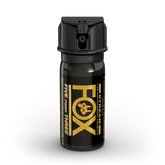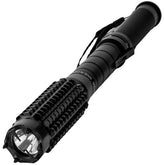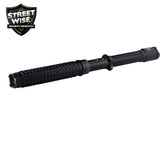Medical investigators armed with pepper spray or stun guns
COLUMBUS, Ohio (AP) — The State Medical Board, responsible for licensing and disciplining physicians, is considering whether to allow its investigators to carry weapons because of concerns for their safety.
The plan is in its early stages, with a vote likely happening Thursday, and it hasn't been decided whether the investigators would be armed with handguns, stun guns or pepper spray.
The board says the plan comes in response to investigations of so-called pill mills, pain management clinics where unscrupulous doctors over prescribe painkillers to people who shouldn't be taking them.
"True pill mills are criminal enterprises," medical board executive director Richard Whitehouse said. "This is in recognition of the fact that we've been involved in cases that are riskier for investigators."
Whitehouse said investigators frequently encounter armed employees or armed patients at pill mills in "some of the worst places imaginable."
While the move isn't in response to any incidents of violence, Whitehouse said his investigators have been in threatening situations and have had to talk their way out.
Chief investigator Doug Edwards said he and his staff of 19 investigators have encountered armed employees at pain clinics in Scioto County, thought to have the state's highest concentration of pill mills.
"You have no idea if the staff is legally carrying," Edwards said. "One guy, his weapon was out in the open in a holster on his hip. I think he wanted everyone to know he had it."
He said their investigations can take them to patients' homes, where the owners may be armed.
"One house had large barking dogs outside, and we didn't even bother to get out of the car," he said.
Portsmouth police Chief Charles Horner, whose force has arrested pill mill owners, said it's common for pain clinics to have armed security.
"Some of the patients, a large number of whom engage in illegal activity, also have guns," Horner said.
Portsmouth police arrested a doctor in 2000 for writing thousands of unwarranted prescriptions for cash. Police video shows the doctor trying to trade pills for assault rifles.
Horner is in favor of arming medical investigators, who would otherwise have to request police escorts, so long as they are sworn peace officers.
Another doctor, James Lundeen, operated a pain clinic in Portsmouth until his license was suspended May 11. He's accused of overprescribing painkillers.
Lundeen said he didn't employ armed security guards at his clinic, where he wrote prescriptions but didn't fill them, but could see why some doctors would.
Arming medical investigators who participated in raids on pill mills is probably an appropriate response, he said.
In May, Gov. John Kasich signed a law that cracked down on clinics that illegally prescribed painkillers. Since then, many have closed. In Scioto County all but one of nine clinics have closed, Portsmouth public health nurse Lisa Roberts said.
The board vote wouldn't allow investigators to carry weapons immediately, but it would let them create and implement a plan to do so. Because the idea is still in its infancy, there are no guidelines yet. The investigators currently aren't required to be sworn peace officers, and they don't have rules as to what type of weapons they could carry or where they would be able to take them.
That worries some observers.
"We would have some pretty serious concerns about having medical board investigators carry firearms and go into medical practices," said Jason Koma, a spokesman for the Ohio State Medical Association, which represents physicians.
He said a "vast majority of investigations" don't involve pill mills.
The medical association would work with the State Medical Board of Ohio to come up with guidelines so that armed investigators aren't walking into a neighborhood physician's office where there's no suspicion of employees carrying weapons, Koma said.
A similar concern was raised by the executive director of the Ohio Coalition Against Gun Violence, Toby Hoover. She wondered what would happen if a hospital under investigation had a sign prohibiting concealed weapons.
If the board were to approve the measure, it would not be the only Ohio agency that arms its employees.
The attorney general's office has a number of units involved in law enforcement, including the Bureau of Criminal Identification and Investigation. As the armed personnel are all peace officers, they are legally allowed to carry firearms.
The auditor's office recently obtained permission to arm four of its investigators.
Perhaps the most similar to the medical board would be Ohio's State Board of Pharmacy, which handles drug enforcement, including criminal investigations. Some of its agents are sworn peace officers, and they're allowed to carry guns as part of an authorized criminal investigation, executive director Bill Winsley said.
The Federation of State Medical Boards does not track which boards arm their employees, but CEO Dr. Humayun Chaudhry said it's not an unusual practice.
Many states require investigators who carry weapons to be sworn peace officers, and Chaudhry said he wasn't aware of any situations in which an investigator has had to draw a weapon in self-defense. He said he couldn't give an example off the top of his head of another state that armed investigators.
If Ohio's medical board approves the measure on Thursday, it would begin to come up with rules, guidelines and training for investigators to carry weapons.
ANDY BROWNFIELD, Associated Press
Published 09:07 p.m., Wednesday, August 10, 2011
Shop Stun Batons
Stun Master 110,000,000 Volt Bad Ass Metal Stun Baton And Flashlight
17 reviews
Looks like a police "billy club" and delivers an amazing 110 million volts of electricity 4.9 milliamps depending on the charge of the batteries Made from some of the strongest material on the planet - high-quality aircraft aluminum High-end tactical 120 Lumen LED flashlight Firm rubberized contoured grip...
- $64.95
$79.95- $64.95
- Unit price
- / per
Streetwise Mini Barbarian Stun Baton Flashlight 9,000,000
2 reviews
The MINI Barbarian is the perfect name for our newest stun baton. If Conan the Barbarian lived in modern times, we are sure this would be his weapon of choice. Even in our more refined culture, there are still “barbarians” who roam the streets....
- $49.95
$54.95- $49.95
- Unit price
- / per
Streetwise Barbarian 9,000,000* Stun Baton Flashlight
5 reviews
Protecting yourself with the Barbarian is as easy as 1,2,3: Identify Threat: An attacker will use the cover of darkness to sneak up on their victims and to hide their identity. He'll also look for the most vulnerable victim. This powerful light beam shined...
- $55.95
- $55.95
- Unit price
- / per
Streetwise Attitude Adjuster Stun Baton Flashlight
3 reviews
Adjusts from 16.5" to 19": With a quick twist of the handle, you can adjust this unit to any desired length between 16.5" and 19". Triple Stun Technology: Most stun guns on the market today have only one or two points of contact. When...
- $59.95
- $59.95
- Unit price
- / per
Tags:















